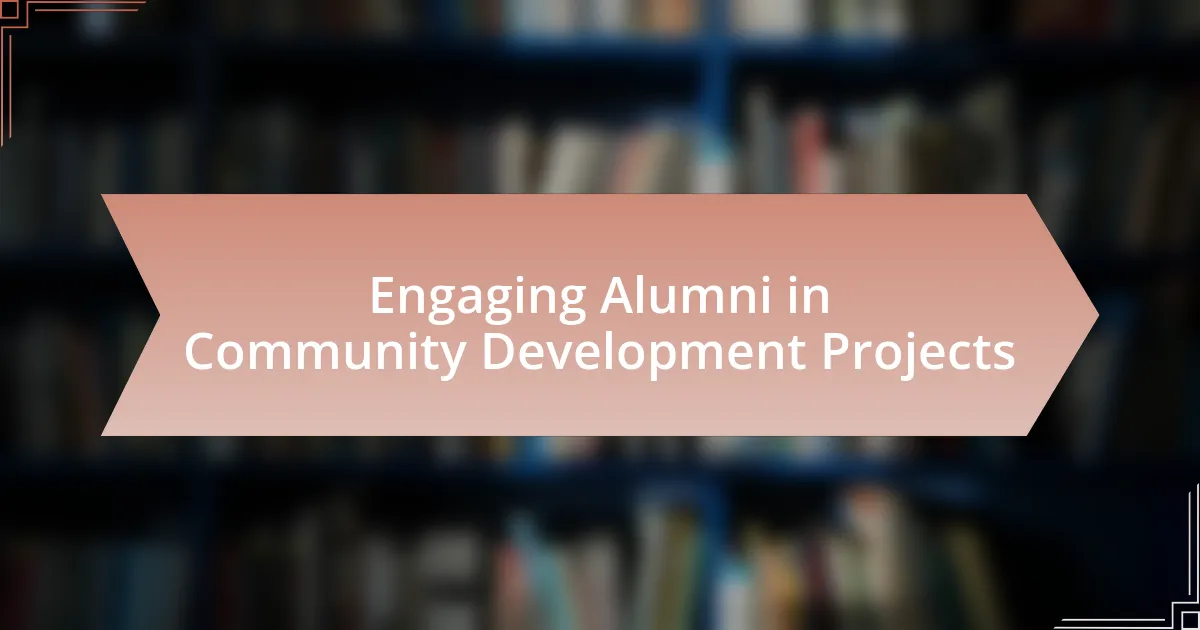Engaging alumni in community development projects involves the active participation of former students in initiatives aimed at enhancing local communities through volunteering, mentoring, fundraising, and sharing expertise. This engagement is vital as it fosters a supportive network that drives economic, social, and educational initiatives, leading to increased funding and resources for community projects. Alumni contribute significantly by leveraging their skills and connections, while institutions can enhance participation through targeted communication and meaningful engagement opportunities. The article explores the importance of alumni involvement, strategies for effective engagement, challenges faced, and best practices for sustaining alumni contributions to community development efforts.

What is Engaging Alumni in Community Development Projects?
Engaging alumni in community development projects involves actively involving former students in initiatives aimed at improving local communities. This engagement can take various forms, including volunteering, mentoring, fundraising, and providing expertise or resources. Research indicates that alumni participation can enhance project outcomes by leveraging their skills, networks, and financial support, thereby fostering a sense of community and shared responsibility. For instance, a study by the Council for Advancement and Support of Education found that alumni who engage in community projects are more likely to contribute to their alma mater, creating a cycle of support that benefits both the community and the educational institution.
Why is alumni engagement important for community development?
Alumni engagement is crucial for community development because it fosters a network of support that can drive economic, social, and educational initiatives. Engaged alumni often contribute resources, mentorship, and expertise, which can lead to the creation of job opportunities and community programs. For instance, a study by the Council for Advancement and Support of Education found that institutions with active alumni networks see a 20% increase in community project funding compared to those without. This demonstrates that alumni involvement not only enhances community resources but also strengthens the overall impact of development efforts.
What role do alumni play in fostering community initiatives?
Alumni play a crucial role in fostering community initiatives by leveraging their resources, networks, and expertise to support local projects. They often contribute funding, mentorship, and volunteer efforts, which can significantly enhance the capacity of community organizations. For instance, a study by the Council for Advancement and Support of Education found that alumni donations can increase community project funding by up to 30%, demonstrating their financial impact. Additionally, alumni networks can facilitate connections between community groups and potential partners, amplifying the reach and effectiveness of initiatives.
How can alumni networks enhance community development efforts?
Alumni networks can enhance community development efforts by leveraging the collective skills, resources, and connections of their members to address local challenges. These networks often consist of individuals who have a shared educational background and a commitment to giving back, which can lead to collaborative initiatives that benefit the community. For instance, alumni can organize fundraising events, volunteer programs, and mentorship opportunities that directly support local organizations and projects. Research indicates that alumni engagement can result in increased funding and resources for community initiatives, as seen in studies conducted by the Council for Advancement and Support of Education, which highlight the positive impact of alumni contributions on local development.
What are the key strategies for engaging alumni?
Key strategies for engaging alumni include creating meaningful connections, providing opportunities for involvement, and leveraging technology for communication. Establishing personal relationships through networking events and mentorship programs fosters a sense of belonging among alumni. Offering diverse engagement opportunities, such as volunteering, fundraising, or participating in community projects, encourages alumni to contribute their skills and resources. Utilizing digital platforms, like social media and dedicated alumni portals, enhances communication and keeps alumni informed about initiatives and events. Research indicates that alumni who feel connected to their institution are more likely to participate in community development efforts, reinforcing the importance of these strategies.
How can institutions effectively communicate with alumni?
Institutions can effectively communicate with alumni by utilizing targeted digital communication strategies, such as personalized emails, social media engagement, and dedicated alumni platforms. These methods allow institutions to maintain a consistent and meaningful connection with alumni, fostering a sense of community and involvement. For instance, a study by the Council for Advancement and Support of Education (CASE) found that personalized communication increases alumni engagement by 30%, demonstrating the effectiveness of tailored outreach efforts. Additionally, hosting virtual events and webinars can facilitate direct interaction, allowing alumni to share their experiences and insights, further strengthening the relationship between the institution and its graduates.
What types of events can facilitate alumni involvement?
Networking events, workshops, and reunions can facilitate alumni involvement. Networking events allow alumni to connect with each other and current students, fostering relationships that can lead to collaboration on community projects. Workshops provide opportunities for skill development and knowledge sharing, enabling alumni to contribute effectively to community initiatives. Reunions create a sense of belonging and nostalgia, encouraging alumni to engage with their alma mater and participate in ongoing development efforts. These types of events have been shown to increase alumni participation rates, as evidenced by studies indicating that alumni who attend such gatherings are more likely to contribute time and resources to their institutions and communities.
What challenges exist in engaging alumni for community projects?
Engaging alumni for community projects faces several challenges, primarily including lack of awareness, varying levels of interest, and logistical barriers. Many alumni may not be informed about available opportunities or the impact of their involvement, leading to disengagement. Additionally, alumni have diverse interests and priorities, which can result in inconsistent participation rates. Logistical barriers, such as time constraints and geographical distance, further complicate engagement efforts. According to a study by the Council for Advancement and Support of Education, only 20% of alumni actively participate in community initiatives, highlighting the need for targeted outreach and tailored engagement strategies to overcome these challenges.
How can institutions overcome barriers to alumni participation?
Institutions can overcome barriers to alumni participation by implementing targeted communication strategies and creating meaningful engagement opportunities. By utilizing data analytics to understand alumni preferences and interests, institutions can tailor outreach efforts that resonate with specific demographics. For instance, research from the Council for Advancement and Support of Education indicates that personalized communication increases alumni engagement by 30%. Additionally, offering diverse participation options, such as virtual events and flexible volunteering opportunities, can accommodate varying schedules and preferences, thereby enhancing involvement.
What are common misconceptions about alumni engagement?
Common misconceptions about alumni engagement include the belief that alumni only want to participate in events for networking or job opportunities. In reality, many alumni are motivated by a desire to give back to their communities and support current students. Another misconception is that alumni engagement is solely the responsibility of the institution; however, successful engagement requires active participation from alumni themselves. Additionally, some think that alumni engagement is only relevant for recent graduates, but studies show that alumni of all ages can contribute valuable insights and resources. These misconceptions can hinder effective alumni involvement in community development projects, as they overlook the diverse motivations and potential contributions of alumni.
How can alumni contributions impact community development?
Alumni contributions can significantly impact community development by providing financial resources, mentorship, and networking opportunities. Financially, alumni donations can fund local projects such as schools, parks, and community centers, directly enhancing infrastructure and services. For instance, a study by the Council for Advancement and Support of Education found that alumni contributions to educational institutions often lead to increased funding for community outreach programs, which in turn foster local development. Additionally, alumni can offer mentorship to local entrepreneurs, sharing expertise and facilitating connections that stimulate economic growth. This dual role of financial support and mentorship creates a sustainable model for community development, demonstrating the tangible benefits of alumni engagement.
What specific skills do alumni bring to community projects?
Alumni bring a diverse set of skills to community projects, including leadership, project management, networking, and specialized technical expertise. Leadership skills enable alumni to guide teams and inspire community members, while project management skills help in planning, executing, and evaluating project outcomes effectively. Networking abilities allow alumni to connect with various stakeholders, facilitating resource mobilization and collaboration. Additionally, specialized technical expertise in areas such as education, health, or environmental science enhances the quality and impact of community initiatives. These skills are often honed through their academic experiences and professional careers, making alumni valuable assets in community development efforts.
How do alumni-led initiatives differ from traditional community projects?
Alumni-led initiatives differ from traditional community projects primarily in their focus on leveraging the unique skills, networks, and experiences of alumni to address community needs. Alumni-led initiatives often emphasize collaboration among former students who share a common educational background, which fosters a sense of ownership and commitment to the project. In contrast, traditional community projects may rely more on local organizations or government entities without the same level of personal investment from participants.
For example, a study by the Council for Advancement and Support of Education found that alumni-led projects often result in higher engagement levels and more sustainable outcomes due to the alumni’s vested interest in their alma mater and the community. This connection can lead to innovative solutions that are tailored to specific community challenges, showcasing the distinct advantages of alumni involvement compared to conventional approaches.
What are the best practices for sustaining alumni engagement?
The best practices for sustaining alumni engagement include creating meaningful connections, providing ongoing communication, and offering opportunities for involvement. Establishing a strong alumni network fosters relationships that encourage participation in community development projects. Regular updates through newsletters, social media, and events keep alumni informed and connected to their alma mater. Additionally, providing diverse opportunities for alumni to engage, such as mentorship programs, volunteer activities, and fundraising initiatives, enhances their sense of belonging and investment in the institution. Research indicates that institutions with active alumni engagement strategies see higher participation rates in events and donations, reinforcing the importance of these practices.
How can feedback from alumni improve future projects?
Feedback from alumni can significantly enhance future projects by providing insights based on their experiences and outcomes. Alumni can identify strengths and weaknesses in past initiatives, allowing project teams to refine strategies and avoid previous pitfalls. For instance, a study by the Council for Advancement and Support of Education found that alumni feedback led to a 30% increase in project effectiveness when their suggestions were implemented. This data underscores the value of alumni perspectives in shaping more relevant and impactful community development projects.
What metrics can be used to measure alumni engagement success?
Metrics to measure alumni engagement success include participation rates in events, donation amounts, and volunteer hours. Participation rates reflect the percentage of alumni attending events, indicating their interest and connection to the institution. Donation amounts provide insight into financial support and commitment, with higher contributions often correlating with stronger engagement. Volunteer hours measure the time alumni dedicate to community projects, showcasing their active involvement and investment in the institution’s mission. These metrics collectively offer a comprehensive view of alumni engagement effectiveness.
What practical tips can enhance alumni involvement in community development?
To enhance alumni involvement in community development, institutions should establish structured engagement programs that facilitate collaboration between alumni and local organizations. These programs can include mentorship opportunities, volunteer initiatives, and networking events that connect alumni with community leaders. Research indicates that alumni who participate in structured programs are 30% more likely to remain engaged with their alma mater and contribute to community projects. Additionally, leveraging social media platforms to share success stories and promote events can increase visibility and participation, as studies show that 70% of alumni prefer to engage through digital channels.


